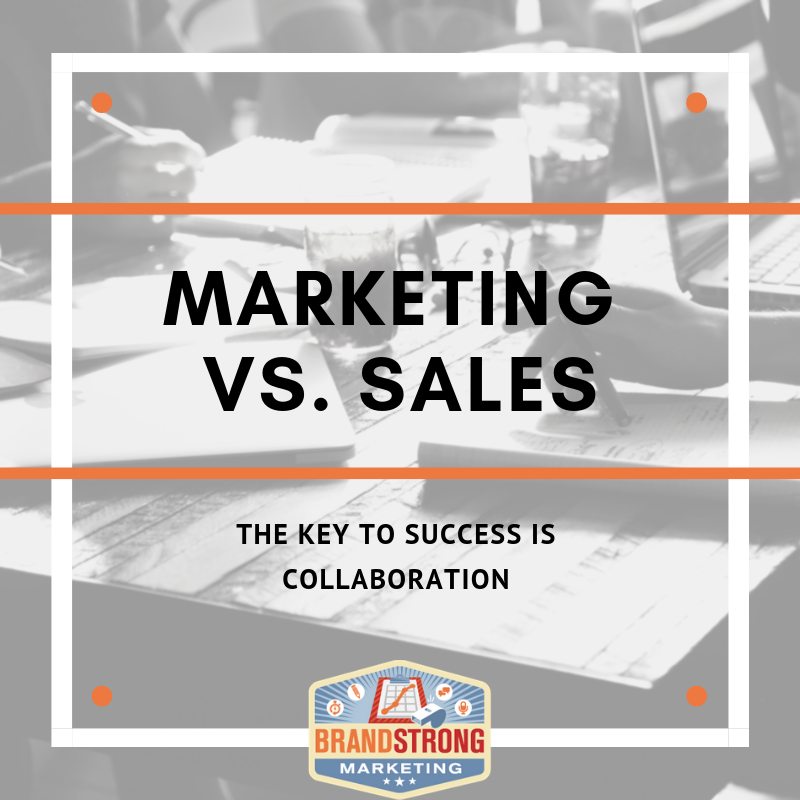Marketing Vs. Sales: What’s The Difference?
 The key to business growth relies on a collaboration between your marketing and sales. Even though they are two equally essential but distinct functions, in today’s environment their roles overlap. Why? Because the buying process has changed so dramatically over the past 10 years so that the lines between the two functions are now blurred.
The key to business growth relies on a collaboration between your marketing and sales. Even though they are two equally essential but distinct functions, in today’s environment their roles overlap. Why? Because the buying process has changed so dramatically over the past 10 years so that the lines between the two functions are now blurred.
If your marketing strategies, messages, and tactics don’t align with what your sales people are saying when they talk with customers and prospects, you will be creating confusion, weakening your brand, and most likely losing the sale. Bummer!
No matter your size or industry, the key to serious growth is aligning your sales and marketing functions. So to help you do that, let’s take a look at the role each function plays in your business and how they intertwine, support, and complement each other more important than ever.
Let’s start by defining the two. A high-level explanation of marketing vs. sales would be that marketing gets you a conversation while sales close the deal. But there’s more to it.
Marketing
 As mentioned above, marketing’s role is to create a conversation. What does this mean? If there is a a person looking for a product or a solution to a problem and there is someone who has the right product or the solution to that problem, marketing gets them together. It alerts the person searching that there is a potential solution to their problem and lets the seller know that someone is interested in their solution. It creates the opportunity for a mutually beneficial conversation to happen.
As mentioned above, marketing’s role is to create a conversation. What does this mean? If there is a a person looking for a product or a solution to a problem and there is someone who has the right product or the solution to that problem, marketing gets them together. It alerts the person searching that there is a potential solution to their problem and lets the seller know that someone is interested in their solution. It creates the opportunity for a mutually beneficial conversation to happen.
Being a marketer, I’m going to tell you that marketing rocks for a number of reasons.
- It grabs the attention of your audience;
- It creates leads;
- It gets prospects to find you instead of you having to find them;
- It engages with your fans;
- It separates you from your competitors;
- It educates your customers and prospects about how you can help them;
- It shares your brand story, building trust in your business based on the promise of the unique value you will deliver; and
- It builds loyalty so you can charge a price premium, run into less competitive threats, and enjoy recurring revenue or increased profitability.
Cool, huh? Good marketing should grab a prospects attention, educate them on your solution, and build enough trust that he or she will call and want to do business with you. And then repeat that process again and again.
Sales
 Marketing is important in order to engage your audience, but what happens once you have their attention and intrigued them enough to want to talk with someone at your company? That is when the sales process comes into play. You answer final questions, overcome objections, close the deal, serve the customer, and make your money. Like marketing, sales also serves to connect a person to your business. Sales completes the process of why someone should buy from you and has the opportunity to create a personal relationship with the customers, leading you to being able to make the current sale but more importantly, future sales as well.
Marketing is important in order to engage your audience, but what happens once you have their attention and intrigued them enough to want to talk with someone at your company? That is when the sales process comes into play. You answer final questions, overcome objections, close the deal, serve the customer, and make your money. Like marketing, sales also serves to connect a person to your business. Sales completes the process of why someone should buy from you and has the opportunity to create a personal relationship with the customers, leading you to being able to make the current sale but more importantly, future sales as well.
Like marketing, sales activity can cover a wide range of tasks. Taking a customer through the sales journey can include all, or some, of the following actions whether you are selling a product or a service.
- Understand what the client is looking to accomplish or the challenge they are trying to solve.
- Once you understand your customer’s needs and how your solution could provide them value, create a proposal or quote.
- But wait, you’re not done yet! After you provide your quote, you may need to work with your customer to overcome their objections.
- Most importantly, follow up with your new customer to make sure they had a great experience.
- Follow up with them at a designated time to see if there is an opportunity for repeat sales or an upsell.
As I said, I think marketing rocks, but as a small business owner I also wear the sales hat. I’ve learned that sales rocks, too! What I love most about sales is building and maintaining those important customers relationships.
Marketing vs. Sales or Marketing and Sales
After looking at the definition and different responsibilities in the sales and marketing process, you should have a better understanding of the objective of each function.
But seeing as how they have such a symbiotic relationship, is Marketing versus Sales the appropriate terminology? Probably not. These two activities work hand in hand, so every conversation you have about growing your business and attracting customers should really include Marketing AND Sales activities. You can’t draw a line and say “Well, I’m just working on marketing today so I don’t need to think about anything in the sales process.”
In our next post we’ll talk about how the market has changed and why it’s even more essential for marketing and sales to collaborate and work together to succeed.






